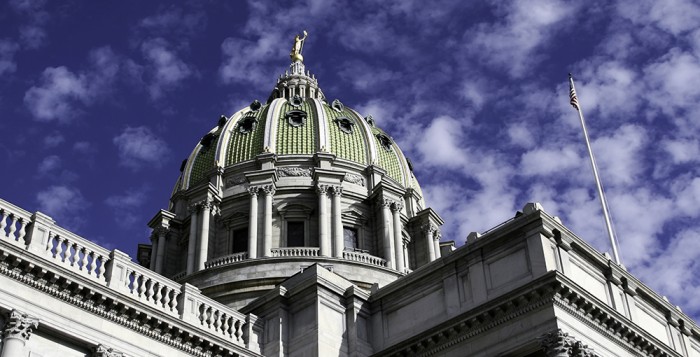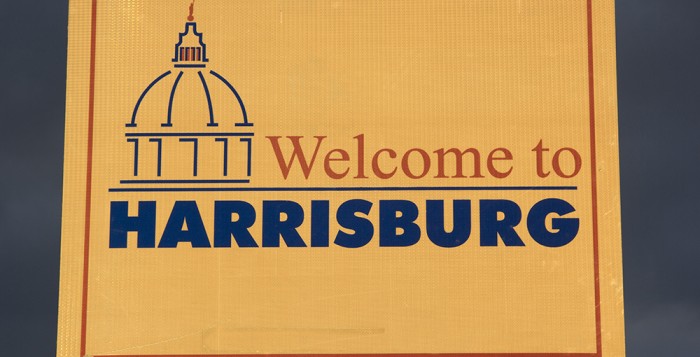By Chris Comisac, Robert Swift and Alyssa Biederman
Capitolwire
HARRISBURG (June 24) – While there’s still a bit more work to be done by lawmakers, the Fiscal Year 2019-20 state budget’s primary document – the General Appropriations budget – is a “done deal” that legislative leaders said will get to the Governor’s desk by Thursday.
Those leaders and Gov. Tom Wolf have agreed to a plan they say will spend $33.997 billion during the coming 2019-20 Fiscal Year, which starts on July 1.
House Appropriations Committee Majority Chairman Stan Saylor, R-York, said the expenditures within House Bill 790 represents a 1.8-percent increase in spending from the current year’s total. That assumes the current year’s spend total is $33.4 billion, which is $700 million more than the amount lawmakers in June 2018 said the FY2018-19 budget spent, which at the time they said was $32.7 billion. Compared to the budget that was passed last June, the planned FY2019-20 spend total represents a roughly 4-percent increase.
Republican leaders, since Wolf unveiled his proposed 2019-20 state budget in February, have said they intended to spend less than the $34.1 billion Wolf said his plan would cost.
And since April’s General Fund revenue collections delivered a significant amount of unexpected revenues, GOP leaders have also indicated they would push to increase the state’s Rainy Day Fund, currently containing about $22.5 million, by whatever amount of surplus revenues exist at the end of the current fiscal year.
Last week, Saylor suggested there wouldn’t be much of the more than $800 million surplus left – maybe $65 million – due to unbudgeted spending that occurred as part of the FY2018-19 state budget, pushing the overall expenditures for FY2018-19 to $33.4 billion.
However, on Monday, after his committee voted 27-9 to report HB790 to the full House, Saylor said between $200 million and $300 million (it appears to be about $212 million) would be deposited into the fund.
He later explained the bulk of that deposit into the fund would come from previously unspent state dollars (lapsed funds) the Wolf administration will make available. Senate Appropriations Committee Majority Chairman Pat Browne, R-Lehigh, later said the money is coming from the state’s “positive revenue position,” and explained anything contributing to that revenue position could be the source of the Rainy Day funding.
Although lawmakers said HB790’s spend total is $33.997 billion, there are hundreds of millions of dollars of spending moved out of the General Appropriations (GA) budget, including $245.2 million of payments for things like the debt service payment for the Tobacco Settlement Fund borrowing that was used to close a $1.5 billion hole in the FY2017-18 state budget ($115 million); the debt service on the Farm Show Lease Fund borrowing that was also used to satisfy the FY2017-18 budget deficit ($13.3 million); a $45 million deposit of collected Personal Income Tax revenue for the School Safety and Security Fund; and debt service payments for the PlanCon and Growing Greener II programs ($20 million each).
Browne acknowledged that spending is in addition to the $33.997 billion included in HB790.
There are several other transfers that appear to be at work in various GA lines items, as well as “aggressive” estimates regarding human services cost growth.
Human Services/Health
The largest of those transfers appear to occur within program lines for the state Department of Human Services.
Similar to last year, the department’s overall spend total for the department manages to be less than the prior year expenditure for the agency and its programs, including Medicaid. This time around, DHS spends $97.3 million less than it did a year ago.
Some of the funding changes are transfers to the state’s Community HealthChoices Medicaid managed long-term care program, while another $36 million in spending for child care services and assistance is replaced with federal funding, but it appears as though roughly $300 million to $400 million in spending disappears from the agency’s line items.
Regarding the significant drop in human services spending, House Republican spokesman Mike Straub later on Monday said $200 million is due to a transfer from Pennsylvania Professional Liability Joint Underwriting Association (JUA), which was established by the General Assembly in 1976 to provide healthcare providers with medical malpractice insurance. Lawmakers have been trying to transfer a significant portion of the JUA’s reserves to the General Fund, but have been blocked three prior years by the federal courts.
The other $200 million is due to the required costs paid to managed care organizations being dropped by that amount.
Later in the day, Browne characterized the reduced human services spending as being aggressive about the expected use of the state’s Medicaid and other human services program.
“A different calculation of human service caseload and rates,” explained Browne. “We are being a lot more aggressive as to the calculation of rates and caseload estimates, believing that will hold.”
He acknowledged that same aggressiveness didn’t hold during the current budget year, as Wolf sought nearly $750 million in supplemental appropriations, most of it to address unbudgeted expenses in the Department of Human Services.
“That’s the question: will it hold for this cycle?” Browne said. “I think it will at this point in time.”
The budget also assumes a savings of $7.17 million due to the elimination of the General Assistance cash assistance program. A few House Democrats, during Monday’s Appropriations Committee meeting to consider HB790, decried the decision to end the program, citing that as one of the reasons for their votes against the bill.
Later in the day, Senate Majority Leader Jake Corman, R-Centre, said the plan is for the Senate to run House Bill 33 with the language currently in the bill and send it to the Governor. Some Democrats suggested Wolf should veto HB33 as there are other legislative vehicles that could accommodate the other components of HB33 – such as a hospital assessment that helps provide funding to Philadelphia hospitals as well as the Medicaid program – unrelated to the cash welfare program.
“I’m pretty confident – at least hopeful – the Governor will sign it or at least allow it to become law,” Corman reacted to the Democrats’ urging that Wolf veto the bill.
Notable increases within departmental lines include an $84.8 million, or 5.2-percent, increase in funding for the Community Waiver Program for those with intellectual disabilities, which will provide home and community-based care for 865 individuals currently on the emergency waiting list. Wolf had proposed a $15 million increase in funding for services to individuals with intellectual disabilities and autism. And the budget devotes $12 million to provide a 2-percent increase, effective January 2020, for homecare workers who care for seniors and those with physical disabilities.
There’s also an additional $26.3 million for Mental Health Services which includes funds to provide home and community-based services for 45 individuals currently residing in state hospitals.
Additionally, Republicans and Democrats praised the 10-percent increases in funding for domestic violence (up $1.736 million) and rape crisis services (up $993,000).
And while not in the Human Services Department lines, all of the Health Department line items zeroed out by Wolf’s proposed budget (something most governors do every year) – for things like Cooley’s Anemia, Hemophilia, Lupus, Sickle Cell, Regional Poison Control Centers, Trauma Prevention, Epilepsy Support Services, Bio-Technology Research, Tourette Syndrome, Amyotrophic Lateral Sclerosis (ALS) Support Services and Leukemia/Lymphoma – are restored by HB790.
Education
The state budget includes a 3.5-percent increase in spending for K-12 education – $432 million according to the House GOP – and a 2-percent, across-the-board increase for higher education
Pre-K funding was increased compared to the prior, but not quite as much as Wolf wanted: HB790 contains a $25 million increase for Pre-K Counts, and a $5 million hike for Head Start; the Governor had sought increases, respectively, of $40 million and $10 million.
Basic education funding goes up by $160 million, not the $200 million Wolf had wanted, while special education funding will increase $50 million and early intervention will go up $15 million – both amounts sought by Wolf as part of his February budget proposal.
Making it more difficult this year to determine the growth in basic education funding is the fact that most of the budget’s line item for School Employees’ Social Security payments is merged with the basic education funding line item, though Rep. Saylor said school districts will continue to get their payment the same way.
The Educational Improvement Tax Credit (EITC), a bone of contention given legislation pushed through the General Assembly in recent weeks and then vetoed by Wolf, got a funding increase, just not the type of increase contemplated by the legislation vetoed last week. The credit will go up by $25 million.
School security grants are again provided for by the state budget, with a total of $60 million again being made available for school districts ($45 million, as noted above, by way of a Personal Income Tax transfer, with the other $15 million, say legislators, coming from a court-related reserve account).
The Legislature restored some lines for which it requests funding annually, but which governors – Republican and Democrat – zero out in favor of their own funding proposals. Two such instances in education are trauma-informed education, which not only was restored but also got a $250,000 increase, and STEM education (Mobile Science and Math Education Programs), which was restored with a $750,000 funding increase.
Legislators from both parties talked up the $10 million increase for career and technical education (the same amount Wolf sought, although HB790 devotes $7 million of the increase to career and technical education and $3 million to career and technical education equipment grants.
HB790 also increases spending on adult and family literacy by $400,000, which Wolf proposed to cut by $400,000, but keep funding for the professional development of teachers flat, at $5.3 million, where Wolf had sought to increase it by $650,000. The budget also allocates $5 million more dollars to public libraries, a more than 9-percent increase from last year and something Republicans and Democrats praised.
House Democratic Minority Appropriations Chairman Matt Bradford, D-Montgomery, pointed out that the budget contains “good news” and reflects the reality of a divided state government. He also said the state’s revenue surplus gave the legislators an opportunity to allocate more funds to education.
“[The surplus] makes it easier to stand with the Governor to make up for some cuts by an earlier administration,” he said. “We can actually see the changes we so desperately need to make to early education.”
About one billion dollars in one-time federal stimulus funding discontinued at the start of this decade, with that hole, at that time, not filled by state funding. Since then, legislators on both sides of the aisle have been attempting to address that hole.
Wolf’s proposed budget did not account for any spending increases in higher education, but HB790 increases funding for many of the state’s higher education options, with the Pennsylvania State System of Higher Education, the commonwealth’s state-related and community colleges receiving two-percent hikes.
Reacting to the budget’s education components, Wolf spokesman J.J. Abbott said, “With this year’s investments, Gov. Wolf has secured nearly $1.2 billion in new education funding since the beginning of his term.”
According to the Governor’s Office, that $1.2 billion figure includes this year’s funding increase of $265 million for education. Additionally, with this year’s 2-percent increase for higher education, the administration notes that over the last five years, higher education funding has increased by $188 million.
Penn State University also received an additional $4 million for its College of Technology. Thaddeus Stevens College of Technology was also appropriated a four million dollar increase – about 27 percent more funding for the college overall.
“We have prioritized career and technical education,” said Saylor. “We are rewarding [these colleges] on placing students in real jobs across the commonwealth.”
Job training and education programs within the department’s budget – another item the Legislature had to reinstate after Wolf zeroed out funding for the program – will see a $6.25 million, or 19.7-percent, increase
Technical training, Saylor said, would improve the skill-sets of the job force and move people out of minimum-wage jobs – a recurring theme from the GOP since leaders said there won’t be a minimum wage hike as part of the budget.
While several House Democrats voted against HB790, Bradford voted for the budget bill, though he lamented the “lost opportunity” of not including a minimum wage hike.
“While there is much good that is in this budget, that missing component is for many of us a bitter pill to swallow,” said Bradford.
For nine Democrats on the appropriations panel, the lack of a minimum wage provision and lack of funding for health care and some other priorities led to their voting no on the budget bill.
“This is a terrible message we are sending to the workers of Pennsylvania,” said Rep. Patty Kim, D-Dauphin, who has offered minimum wage hike bills in the current and past legislative sessions.
Environmental Protection/Conservation and Natural Resources
The new budget bill would tap about $26 million from special funds to support the operations of the two key state environmental agencies, the Department of Environmental Protection and Department of Conservation and Natural Resources.
This is about two-thirds less than the $78 million in funding transfers to support the two agencies proposed by Wolf in his February budget address.
“It’s significantly less,” said Wolf spokesman J.J. Abbott.
Sen. Corman said the funding transfers in the budget bill reflect what the governor asked for.
The reduction reflects discussions with lawmakers and advocacy groups that led to a compromise, said Abbott.
Under HB790, DEP’s operations would be supported by $21 million in transfers from the Environmental Stewardship Fund and DCNR’s operation would be supported by an additional $5 million in transfers from the Oil and Gas Lease Fund. DCNR’s Heritage Parks program would be mostly supported by transfers from the stewardship fund.
The stewardship fund is built on revenue from trash tipping fees and a share of natural gas drilling impact fees. The oil and gas fund is built on royalties from oil and gas drilling in state forests.
If the bill is adopted, DEP’s share of funding from the taxpayer-supported General Fund would decline by 13.4 percent and DCNR’s share of funding from the General Fund would decline by 4.5 percent
The Keystone Recreation, Park & Conservation Fund, a popular venue for funding local park and recreation projects, would no longer be tapped to support DCNR as was proposed initially, said Abbott.
Wolf proposed the transfers as a way to achieve a no-tax budget and in anticipation of passage of his Restore Pennsylvania plan which calls for levying a state severance tax on natural gas production to help support a wide range of infrastructure projects, including projects in state parks and forests.
But the governor drew criticism from some Democratic lawmakers during last winter’s budget hearings about the scale of the fund transfers. They voiced concerns that fewer local projects would receive state aid as a result and the environmental agencies would have to rely more on gas drilling revenue.
Meanwhile, Republican legislative leaders have said any talk about Restore PA is off until the fall amid talk they may push their own infrastructure plan that doesn’t include a severance tax.
Despite that, Abbott said, “There is not going to be any letup for Restore Pa from us.”
Agriculture
For the past two months, Gov. Wolf and lawmakers of both parties have been developing a bipartisan package to aid Pennsylvania’s economically troubled farmers.
The unveiling of HB790 reveals the appropriations price tag for this package will be $19.5 million.
The Department of Agriculture is slated to receive $171.2 million in state funding in the next fiscal year, an increase of $19.5 million. House Republican leaders said the additional $19.5 million in funding will ensure farmers have the tools they need to succeed.
The spending initiative includes four new or revamped line items: Agriculture Preparedness and Response, including an existing appropriation to combat the Spotted Lanternfly, $4 million; Agriculture Business and Workforce Investment, $4.5 million; Livestock and Consumer Health Protection, $1 million and Animal Health and Diagnostic Commission, $2 million.
The House and Senate are at work sending enabling legislation for specific programs within these new line items to the other chamber as the spring session nears an end. The package will likely include state tax credits and low-interest loans to help farmers that may be included in fiscal code bills.
The Senate Agriculture and Rural Affairs Committee on Monday approved five House-passed agricultural aid bills, including House Bill 1516 to create an agricultural disaster response fund; House Bill 1514 to provide for farm-to-school grants; House Bill 1590 to create a $5 million dairy capital investment program; House Bill 1520 to create a state grant program to help small meat processors and House Bill 1526 to create a program to help farmers implement best management practices.
“June may prove to be the most productive month ever for pro-Dairy legislation,” said PA State Grange President Wayne Campbell referring to SB585 to create a state commission looking at the future of the dairy industry and HB 1590.
What’s not in the budget
As noted above, a minimum wage hike won’t be considered as part of the budget, though legislative leaders said discussions continue, with Republicans maintaining they’ll only consider a “reasonable” wage hike proposal while indicating that’s not how they see the Governor’s current proposal: to immediately go to $12 an hour, with stepped increases to an hourly rate of $15, and thereafter adjusting the rate annually based on the consumer price index.
Other notable items not in the budget:
- Money for counties to purchase new voting machines. Republicans have said the Governor created the current situation by signing an executive order stating all counties must purchase new machines that leave a paper trail, so he’s on the hook for finding a funding solution or deciding not to decertify machines; Corman did suggest that some funding might be found as part of ongoing discussions about other election code bills, however he said there’s been no agreement as part of that larger conversation as yet, nor does it necessarily have to be resolved this week;
- A per-capita tax on municipalities that don’t maintain their own police forces – instead, the budget adds $97 million in the General Fund for State Police, with that amount of funding to lower the amount of Motor License Fund dollars going to the State Police (which will also get a $9.7 million appropriation for three more cadet classes);
- Additional funding for the U.S. Census, which the Wolf administration and others had hoped would get $12.8 million to help with efforts to count the state’s population – Republicans argued the Census is a federal government function for which the state doesn’t need to appropriate additional funds;
- Changes to the state Corporate Net Income Tax and implementation of combined reporting, as proposed by Wolf in February.
Questions, contact RCPA Director of Government Affairs Jack Phillips.












